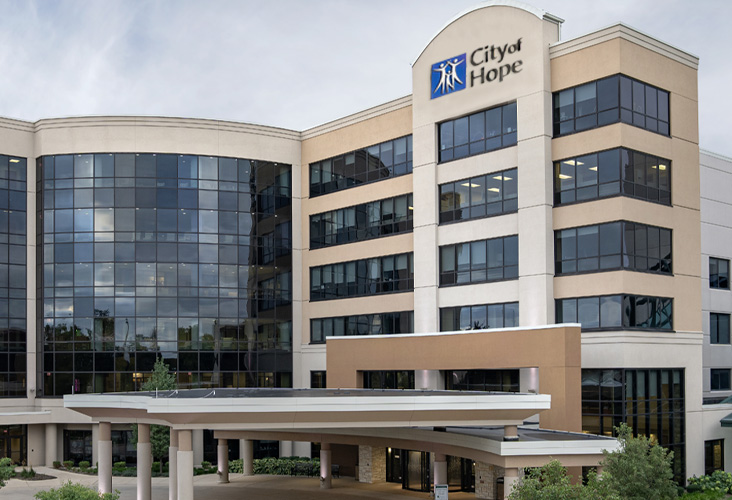

The Gastroenterology Department at City of Hope Chicago, offers comprehensive treatments for a wide range of digestive system cancers. City of Hope Chicago treats patients with colorectal, pancreatic, esophageal, stomach and liver cancer. The gastroenterologists at our Chicago hospital may also help treat lung or breast cancers that have metastasized (or spread) to the gastrointestinal system. The team is led by experts who diagnose, stage and treat gastrointestinal cancers, as well as precancerous conditions such as Barrett’s esophagus, a risk factor for esophageal cancer.
Learn more about our Barrett's esophagus treatment program
Our gastroenterologists employ a number of minimally invasive techniques to treat tumors and help reduce cancer-related symptoms. These trained clinicians meet with patients to obtain a thorough medical history, including a review of symptoms. The gastroenterologists use diagnostic tests and procedures, such as colonoscopies and endoscopic ultrasounds (EUS). Colonoscopies are used to help diagnose colorectal cancer, and to determine the source of abdominal pain or other symptoms. A gastroenterologist may also conduct a biopsy, if necessary. Gastroenterologists also use endoscopic ultrasounds to obtain images of the GI tract and surrounding regions, by inserting a camera-tipped device into the mouth or rectum.
In treating pancreatic cancer patients, endoscopic ultrasounds may also be used to inject chemotherapy into a pancreatic tumor, which may shrink tumors and relieve pain. Gastroenterologists can also use the EUS to drain fluid from pancreatic pseudo cysts. In addition, the ultrasounds allow clinicians to insert fiduciary markers onto tumors, enabling radiation oncologists to target tumors more directly.
Led by Pankaj Vashi, MD, Chair of the City of Hope Department of Medicine and Medical Director of Gastroenterology/Nutrition & Metabolic Support at City of Hope Chicago, our multidisciplinary team of physicians has expertise in performing cancer-related procedures in the gastrointestinal (GI) tract. Your care team may include a gastroenterologist, radiologist, surgical, medical and radiation oncologists, dietitian, naturopathic clinician, and other cancer experts across a variety of disciplines.
The gastroenterology team works together to understand your individual needs and provide comprehensive, personalized treatments tailored to your needs. The team meets regularly to discuss your progress and modify your treatment accordingly.
When you arrive at our hospital, your care team will review your symptoms with you and obtain a health history. Then, we’ll use a variety of diagnostic tools and interventional procedures to evaluate the tumor(s). We usually get diagnostic test results back within one to two days.
We’re committed to finding options for each patient, including those with advanced-stage disease. Our experts are trained and experienced in using innovative techniques and ablative treatments to help remove obstructions in the GI tract and relieve pain or breathing problems. For example, for pancreatic cancer patients, we may perform therapeutic endoscopic ultrasound (EUS) to relieve pain, deliver intratumoral chemotherapy or drain pancreatic pseudocysts (fluid build-up around the pancreas). We may also use EUS to place fiducial markers in pancreatic masses prior to radiation therapy for more precise targeting of tumors.
Some common side effects of cancer treatment are pain, nausea, decreased appetite, fatigue, constipation and diarrhea. We recognize that these symptoms may delay or interrupt your treatment and interfere with your ability to fight the disease.
Throughout your treatment, your care team will use multiple measures to help reduce symptoms. For example, we may prescribe anti-nausea medications prior to treatment to manage nausea. We also work with your dietitian to support your dietary needs to help you get the nourishment you need.
To reduce pain, we may prescribe medications or implement other methods. We can also use EUS to perform celiac plexus block, a procedure that blocks nerves in order to alleviate pain.
In addition to nutrition therapy and pain management, your care team may offer other available supportive care services throughout your treatment, such as oncology rehabilitation and mind-body medicine, to help keep you strong, reduce side effects and improve your well-being.
 Pankaj Vashi, M.D.
Gastroenterologist
Pankaj Vashi, M.D.
Gastroenterologist
 Evan Pisick, M.D.
Medical Oncologist
Evan Pisick, M.D.
Medical Oncologist
 Hatem Halabi, M.D., F.A.C.S.
Surgical Oncologist
Hatem Halabi, M.D., F.A.C.S.
Surgical Oncologist
 Edward Kaplan, M.D.
Medical Oncologist and Director of Gastrointestinal Malignancies, North Shore
Edward Kaplan, M.D.
Medical Oncologist and Director of Gastrointestinal Malignancies, North Shore
 Mani Mahdavian, M.D.
Interventional Gastroenterologist, City of Hope Chicago
Mani Mahdavian, M.D.
Interventional Gastroenterologist, City of Hope Chicago
 Karan Shah, M.D., M.B.A.
Radiation Oncologist and Co-Medical Director, Breast Program
Karan Shah, M.D., M.B.A.
Radiation Oncologist and Co-Medical Director, Breast Program
 Karen Smorowski, M.D.
Radiation Oncologist, City of Hope Chicago
Karen Smorowski, M.D.
Radiation Oncologist, City of Hope Chicago
